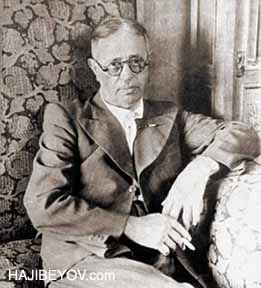|

Autumn 2001 (9.3)
Pages
54-55
Preserving the
Musical Past
7 New
CDs: Major Works of Uzeyir Hajibeyov
by
Betty Blair
Visit Hajibeyov.com
Uzeyir Hajibeyov (1885-1948)
If you really want to understand Azerbaijani culture, listen
to their music. You'll discover a unique synthesis of the old
and the new, of the East and the West. You'll encounter a spirit
of diversity, internationalism, tradition and improvisation,
all combined with strong intellectual rigor. But above all, you'll
discover a passion for life.
  Azerbaijanis
credit Uzeyir Hajibeyov, whom they consider the "Father
of Composed Classical Music in Azerbaijan", with establishing
the direction of contemporary music at the beginning of the 20th
century. He did this primarily in two ways: first, by insisting
that traditional modal music could and should be transcribed,
and second, by fusing Eastern traditional elements (melodies,
modes and the use of instruments like the tar, saz, kamancha
and zurna) with Western genres such as opera, symphonic orchestra
and choral music. What emerged was a unique synthesis of sound
that can be recognized as distinctly Azerbaijani. Other pioneering
accomplishments include: Azerbaijanis
credit Uzeyir Hajibeyov, whom they consider the "Father
of Composed Classical Music in Azerbaijan", with establishing
the direction of contemporary music at the beginning of the 20th
century. He did this primarily in two ways: first, by insisting
that traditional modal music could and should be transcribed,
and second, by fusing Eastern traditional elements (melodies,
modes and the use of instruments like the tar, saz, kamancha
and zurna) with Western genres such as opera, symphonic orchestra
and choral music. What emerged was a unique synthesis of sound
that can be recognized as distinctly Azerbaijani. Other pioneering
accomplishments include:
First Opera (1908)
Hajibeyov is credited with composing the first opera in the Muslim
East at age 22. The plot was based on a thousand-year-old Arabian
legend, "Leyli and Majnun." It was the first example
of traditional mughams being used in their unwritten, improvisational
form, but within the broader context of the European opera genre
and a symphonic orchestra.
First Use of Harmony (1908)
Azerbaijani music is traditionally characterized by a single
melodic line. Hajibeyov introduced four-part harmony, which he
used in his opera chorus. He later went on to write several choral
works and cantatas.
First Musical Comedy (1910)
Hajibeyov is remembered for composing Azerbaijan's first musical
comedy. He wrote three comedies in a very short period of time.
They include: "Husband and Wife" (1910), "O Olmasin,
Bu Olsun" (1911) and "Arshin Mal Alan" (1913).
In each comedy, he satirizes many of the traditional feudal patriarchal
beliefs, particularly as they relate to the veiling of Muslim
women and its implications for choosing marriage partners.
First Woman on
Stage
(1912)
Hajibeyov shocked Baku by inviting 15-year-old Shovkat Mammadova,
recently back from her Italian musical studies, to sing at one
of his performances. Not only did she - a female - perform on
stage, but she did so without wearing a veil. Many concertgoers
were enraged, and Shovkat had to flee out the theater's back
door. Prior to this concert, men had always performed the female
roles on stage.
First National
Anthem
(1918)
Since Hajibeyov was politically active in the formation of the
independent, but short-lived (1918-1920), Azerbaijan Democratic
Republic, he was invited to write the country's first National
Hymn. When the Soviets came to power in Azerbaijan, they asked
him to write another anthem for the Azerbaijan Socialist Republic
(1945). In 1991 the independent Republic of Azerbaijan officially
re-adopted Hajibeyov's original hymn as its National Anthem.
First folk Orchestra (1931)
Hajibeyov was the first to establish an orchestra of traditional
Azerbaijani instruments (tar and kamancha) that performed composed
classical music as well as the more traditional improvised music.
In addition to traditional Azeri folk music, their repertoire
also included compositions by Mozart, Chopin, Schubert, Bizet
and Glinka.
Foreign Music Teachers (1920s1940s)
As Rector of Baku's Music Conservatory, Hajibeyov invited luminaries
of the Russian professional music world to teach in Baku. As
a result, Azerbaijani musicians, who had had no tradition of
even reading notes in 1900, were able to perform music at a world-class
level within a very short period of time, a phenomenon that Hajibeyov
witnessed even in his own lifetime.
First Mugham Theory (1945)
Hajibeyov systematically analyzed Azeri modal music and wrote
the fundamental theoretical work, "The Principles of Azerbaijani
Folk Music," setting forth ideas about the basic logic and
aesthetics inherent in traditional mugham music.
First Honors as
Composer
Hajibeyov was the first composer in the entire Soviet Union to
be named "People's Artist of the USSR" (1941). He also
received the coveted Lenin Award (1938) and two Stalin Awards
(1941 and 1946). He was a Founding Member of the Academy of Sciences
(1945) and among its first Academicians. He served as Deputy
of the All-Soviet Parliament (late 1940s).
____
From Azerbaijan
International
(9.3) Autumn 2001.
© Azerbaijan International 2001. All rights reserved.
Back to Index
AI 9.3 (Autumn 2001)
AI Home
| Magazine
Choice
| Topics
| AI Store | Contact us
Other Web sites
created by Azerbaijan International
AZgallery.org | AZERI.org | HAJIBEYOV.com
|